You’ve all seen our bright and shiny food trucks scooting around town or serving at your offices and neighborhood food truck Fridays, but have you ever thought about the behind the scenes story of the food trucks? Where do they live? How do they prep? How does a restaurant on wheels operate without all the bells and whistles of a brick and mortar? For more and more food trucks, all those questions are answered by Food Truck City. This oasis located off Richard Street near University and Phillips has all the amenities that food truck owners need to be able to operate throughout their busy weeks. We were recently invited out to Food Truck City to check out the property and learn about what they’re doing to stand out as the newest home for food trucks.
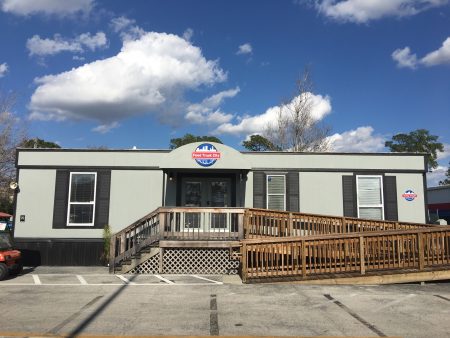
Welcome to Food Truck City
Owner Bob Fleckenstein set out to brand Food Truck City as a community within a community. Bob had previous experience in manufacturing and storage of food trucks with a former business partner. Bob was ready to start an organization of his own, and found the current piece of land that miraculously was permitted, ready for build out, and just a couple minutes drive from Restaurant Depot. Bob told us, “I started this facility because I thought there was a need for these trucks to have a place where they live. We wanted it to be like an office. We envisioned it as it is with a conference room, a lounge, and around the corner from Restaurant Depot. I saw the trucks every day going over the overpass there, so I wanted to develop and design this strictly for food trucks. We sat down and started to figure out what they would need.”
Bob and managing partner Bruce indeed made a comprehensive list of everything a food truck could possibly need and built it into the property. The property is secured, gated, and fenced with access codes for the trucks to come and go. Once the trucks enter food truck city, they go to their designated spot that they rent monthly. There are a variety of living options for the trucks from just reserved parking to custom built shelters with storage sheds. The property functions as a full licensed commissary for the trucks including a gourmet kitchen and dishwashing area that follows all state and city regulations for health inspections. The trucks can fill up with propane and ice on site, wash their trucks, and dispose of their grease and gray water all within a short loop drive from their parking spot. They even have individual electric meters on their storage units to provide fair pricing for each owner. Inside the front office, Bob and Bruce have also provided a conference room and lounge area for the truck owners to relax after long work days. The entire property is well lit for evening returns or early morning prep sessions and has security cameras for peace of mind. With initial investments upward of $50,000 in a food truck, that level of comfort for a business owner is invaluable.
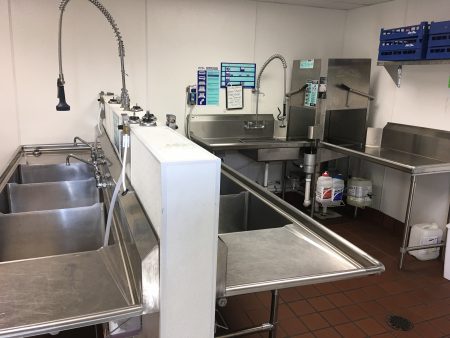
Food Truck City Prep Kitchen
Bob further explained, “We structured it where each truck can afford to be here. Our monthly rental fees start at $150 and go up to $600 depending on the services needed. What food trucks lack the most is storage, so we gave them a storage shed. It has 120 square feet of storage. It’s wired to support their freezer and fridge. They’re able to store food there because we are a licensed commissary. We can help them with their permitting process because of that too. We were nervous at first. We built out sheds and they sat empty for several months. I was even offering free propane to get people to come look around. People didn’t have time, or they were happy where they were. It was discouraging for the first few months. But then one truck came, then they told someone else. Fusion brought four trucks with them!”
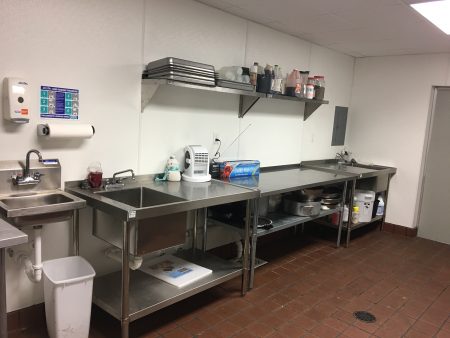
Food Truck City Prep Kitchen
What Bob didn’t expect to do was to strengthen the growing food truck community by providing a familial atmosphere. “There is such a synergy between all these food trucks”, Bob said, “They all get along well. They help each other. If one of them has a problem, they’re all going to help. Every truck that comes here and stays, they can’t believe how friendly everyone is. They help eachother get bookings. It’s a community where everyone gets along. We have a good time. We have beer, wine, we have a fridge. I’m personally putting on weight being here because guys like Bill (Skipper, of BBQ Jax) bring breakfast in. I enjoy the camaraderie of everything.”
Bill, a legend of BBQ in Jacksonville, was finishing his breakfast shift when we were conducting our interview and sat with us to give us the food truck owner perspective. For Bill, he said the upgraded facilities are what brought him over as one of the first tenants of Food Truck City. Bill explained, “Ultimately for me it was the addition of the kitchen facility. I am self sufficient and I can do everything on board the truck, and I do a lot, but it’s a hell of a lot easier with big sinks available. I had to come over here to get water and to dump water anyway with the commercial water supply. Bob started putting up the kitchen and I thought ‘Let me move over before they’re full.’ I was parked with Fusion and The Salty Dog at another commissary. Before then I parked at a restaurant. I’ve seen the good, the bad, and the ugly. This is the good. You’ve got solid surface parking, you don’t drown when it rains, you don’t have to worry about your generator migrating, water and sewer are city supply. And it’s nice having other trucks around because we can trade ideas. They all know each other but now they can mingle with each other. If I have an event where I need another food truck, I can walk around the corner and talk to Gary (Lathion, of Latin Soul). There just is nowhere else you can get water, grease disposal, adequate dumpsters, pest service, and a full kitchen.” Newcomer to the food truck scene Evan Eriksen of Pie95 thought the same thing about making Food Truck City his home. Evan told us, “It’s a community there, it’s not just a location to park your food truck. With all the A-list trucks and experience and knowledge, it’s just a no-brainer.”
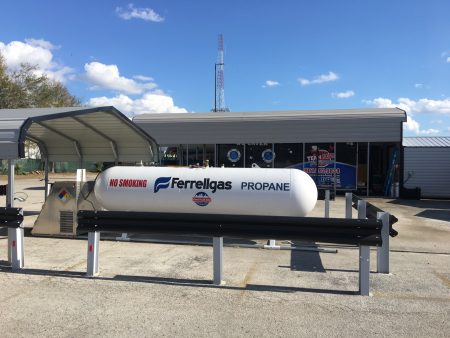
Food Truck City- Fuel Up!
Indeed, with heavy hitting trucks like BBQ Jax, Latin Soul, Fusion, and Mama’s Food, the years of experience literally next door will come in handy for new truck owners. Food Truck City has room for 60 food trucks. They’re currently at 24 and looking to bring in at least one truck per month in 2017. Their current recruitment method is heavily word of mouth, as the food truck owners bring in their friends from other commissaries and Bob and Bruce visit large food truck events to introduce themselves and their brand. While Food Truck City may be a hair more expensive than other commissaries in the area, Bob, Bruce, and their tenants are aware of the value that is being offered. Bob told us,”When I first started this people said food trucks were a fad. And here we are. Most everyone that is opening and has a new truck comes by. My goal right now is to start making a profit. The first year, there is a fairly large initial investment. The plumbing, the electric, the shelters. With just a few more trucks I will be on the positive side. By the end of 2017 I would love to have about 40 trucks in here and hopefully I’ll have most of my capital improvements back. I was very fortunate to find this lot already permitted. If you’re out trying to find a two acre zoned lot you just won’t find it. They’ll have a heck of a lot more investment than I had. In the future there may be a way to form an association and get the trucks to buy their own places, like a condo. I won’t be around forever so it’d be nice to have a way they can buy their place. I’ve had several investors approach me that would like to get involved in this. To be honest with you if I was younger I would take this everywhere there is food truck activity. It’s a lot of work, and takes a lot of money!”
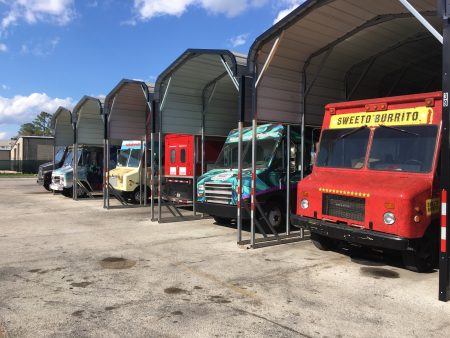
Food Truck City- Trucks at Home
Bob has a passion for food trucks that helps him stand out not as a businessman with a property, but as a friend offering a service. Food truckin’ isn’t easy, and to have someone who gets it and tries to make accommodations in whatever way possible out of genuine compassion is refreshing. Bob said, “I have so much respect for these guys. They are running a business. They do everything that you have to do in a business. The mechnical, the driving, the shopping, the prep, the washing the dishes, collecting money. It is a restaurant on wheels, but it’s more than a restaurant and it’s harder than a restaurant! We try to have everything they need. If we don’t have it and they need it we get it.”
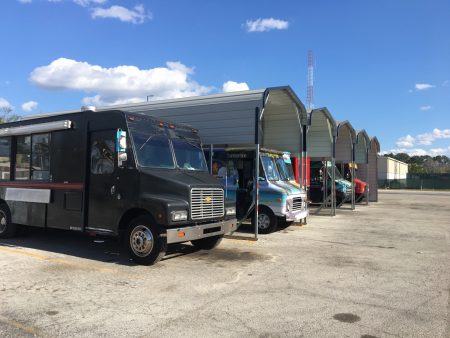
Food Truck City- Trucks at Home
It’s that attitude that will continue to progress the growth of Food Truck City. What started as just a handful of shelters premade has led to constant construction as they prepare to house more trucks. With an explosive growth in the food truck community in Jacksonville lately, it will no doubt be home to many more mobile eateries soon. For veterans like Bill Skipper, he will continue to stay because the location is ideal with it’s central vicinity and access to Restaurant Depot. His move from his former commissary saved him nearly $45 a week in gas alone. These are the benefits that customers may never be aware of, but it helps food truck owners keep prices steady, daily operations run more efficiently, and truly it helps make them all better as they learn from each other and grow together. Food Truck City couldn’t have planned to become a home, not just a house. But they did. And their resident food trucks and all the hungry food truck customers in Jacksonville have reaped the benefits of Food Truck City’s hard work.